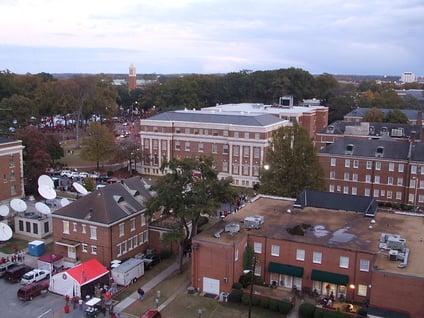The Cancer Prevention and Research Institute of Texas (CPRIT) awarded more than $9 million in research grants to Texas A&M University. Of the $9,057,870 in funding from CPRIT, more than $7.7 million is for academic research and $1.35 million is for a prevention grant. Eight grants were awarded by CPRIT. The largest was $5,793,075 to the recently established Center for Advanced Microscopy and Image Informatics (CAMII) in the Institute of Biosciences and Technology, College of Medicine.
Read MoreTags: TAMU, Biotechnology Vendor Fair, Texas A&M Research, Texas A&M Life Science Funding, biotech vendor show, Texas A&M, Research equipment, cancer researchers, cancer research grant, laboratory suppliers, BioResearch Product Faire, medical marijuana, colon cancer
Last year, the University of Alabama at Birmingham Comprehensive Cancer Center was awarded a five-year, $29 million grant for the National Cancer Institute. The Cancer Center now receives nearly $6M a year in NCI core funding and will continue to do so through 2021. In addition to this core grant, UAB CCC has received over $8.5M in research funding from the NCI during the first half of 2017. This brings their total NCI funding to $14.5 million.
Read MoreTags: Bioresearch funding, cancer research, Alabama, University of Alabama, Cancer Treatment, Cancer, University of Alabama Birmingham, UAlab, UAB, University of Alabama at Birmingham, Cancer Center, cancer researchers, fight cancer, cancer reserach, Bioresearch Grant, Comprehensive Cancer Center
 (Image courtesy of Wikimedia commons)
(Image courtesy of Wikimedia commons)
University of Alabama at Birmingham received a $29 million grant from the National Cancer Institute. This five year core grant will support six research programs at the UAB Comprehensive Cancer Center. The renewal of the Cancer Center Support Grant, the most prestigious federal grant that a cancer research and treatment program can earn, also extends UAB’s elite “comprehensive” designation. According to the UAB News website this designation is awarded for scientific excellence and the ability to integrate diverse research approaches in the fight against cancer.
Read MoreTags: Bioresearch funding, cancer research, Alabama, University of Alabama, Cancer Treatment, Cancer, University of Alabama Birmingham, UAlab, UAB, University of Alabama at Birmingham, Cancer Center, cancer researchers, fight cancer, 2016, cancer reserach, Bioresearch Grant, Comprehensive Cancer Center
It’s not an uncommon dream for cancer researchers and patients afflicted with cancer to find a way to make cancer cells self-destruct: Remarkably, cancer researchers at the University of Texas, Austin may have found a way to do just that. By ferrying sodium and chloride ions into the cancer cells, the cells are triggered to go through apoptosis, or a programmed cell death.
Tags: 2014, University of Texas, cancer research, Southwest, UTAust, Austin, BioResearch Product Faire Event, 1 day only, TX, cancer researchers

